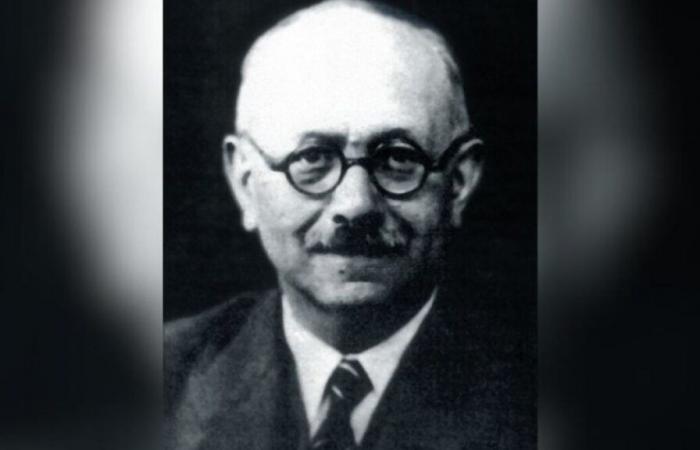“For his work, his teaching and his courage, we decide that Marc Bloch will enter the Pantheon.” It is with these words that the President of the Republic, Emmanuel Macron, announced this Saturday, November 23, the upcoming pantheonization of the historian and resistance fighter, shot by the Gestapo in 1944.
If Marc Bloch paid with his life for his commitment to the Resistance during the Second World War, this is far from being the only reason which motivated his entry into the Pantheon. A look back at a man's commitment to education and the Republic.
History teacher, he was mobilized in 14-18
Born into a non-practicing Jewish family in 1886 in Lyon (Rhône), Marc Bloch is the son of Gustave Bloch, a renowned professor of ancient history who taught at the University of Lyon but also at the École Normale Supérieure. Building on this family heritage, the teenager achieved an exemplary education, joining the Louis-le-Grand high school in Paris. He then entered the École normale supérieure in 1904 and obtained his aggregation in history four years later.
The small and thin man, with a distinguished appearance and thin intellectual-rimmed glasses, began his career as a teacher in high schools between 1912 and 1914, in Montpellier (Hérault) then in Amiens (Somme). But the First World War led him to be called up for military service. Mobilized as an infantry sergeant, he rose to the rank of captain at the end of the conflict. He was decorated with the Legion of Honor and the Croix de Guerre with four citations.
Founder of the “Annals of Economic and Social History”
It was at the end of the Great War that he married Simone Vidal, in 1919, the year he returned to teaching. He was appointed “lecturer of Middle Ages history at the Faculty of Letters of the University of Strasbourg, then obtained the chair of Middle Ages history in 1927”, details the higher establishment.
He will then meet a man who will turn his life upside down: Lucien Febvre. The two men founded together in 1929 the “Annals of Economic and Social History”, the spearhead of the French historiographical school. Long considered the most prestigious history journal, it has influenced many historians around the world. This success allowed him to join the Sorbonne in 1936 as a history professor.
“He is the founder of the history of mentalities, beliefs, ways of thinking,” summarizes historian Julien Théry. With his master book “Les Rois thaumaturges” (1924), in particular, he gave “history another object than the great names, the great events, the battles”. Its pioneering methods allow a new approach, with “a History that is interested in the depths of society” and captures man in all his aspects. “It prefigures Fernand Braudel” and his “Identity of France”, adds Julien Théry.
“The Strange Defeat”, his greatest success
“Passionate about the Republic” and a great patriot who signed the manifesto of anti-fascist intellectuals in the 1930s, this atheist Jew was mobilized again in 1939 at his request, when he was 53 years old, had six children and suffered from disabling polyarthritis. “I am the oldest captain in the French army,” he said.
After a stint in Alsace, he was transferred to serve in the North. At the end of the Armistice of June 22, 1940, through which the government of Marshal Pétain conceded its defeat to the German Third Reich, Marc Bloch found his family in the Creuse. He then wrote “The Strange Defeat”, an uncompromising work. And the best known, published posthumously after the war, recounting from the inside, in an implacable manner, “the most atrocious collapse of our history”.
At the time, it was impossible for him to continue his job as a teacher: the Vichy regime put in place a law which prohibited Jews from working in the public service and, by extension, in teaching. He was finally “discharged” for “exceptional scientific services rendered to the French State” and resumed his teaching in January 1941 within the Strasbourg faculty, at the time established in Clermont-Ferrand (Puy-de-Dôme ).
A resistance fighter who continued teaching until the end
But when the Germans invaded the free zone in November 1942, he had to give up again. With his family, he took refuge in the family home in Creuse, before once again choosing the France he loves so much. “Marc Bloch only had faith in one idea, the Republic,” underlines his granddaughter, Suzette Bloch. He said that he only claimed his Jewishness “in one case: in front of an anti-Semite”.
“France, from which some would conspire to expel me (…) will remain, whatever happens, the homeland from which I cannot uproot my heart,” he wrote. The history professor joined the Resistance, plunged into clandestine life in Lyon, and joined the Franc-Tireur movement. Under the pseudonym “Chevreuse”, then “Arpajon” and “Narbonne”, he formed the Liberation Committees of the region.
He was arrested on March 8, 1944, interned in Montluc prison and tortured for days. In captivity, he becomes a teacher again and instructs his comrades in misfortune. “If I escape, I will resume my classes,” he confided to them. He was finally shot by the Gestapo on the evening of June 16, 1944 in a bushy field near Lyon. Executed with a machine gun in the back. With 29 other comrades, tortured in groups of four.
His ashes were transferred in 1977 to the family vault in the Bourg-d'Hem cemetery (Creuse). With two simple words engraved as an epitaph, “Dilexit veritatem” (“I have cherished the truth”), the motto written in 1941 in his “Spiritual Testament”.






